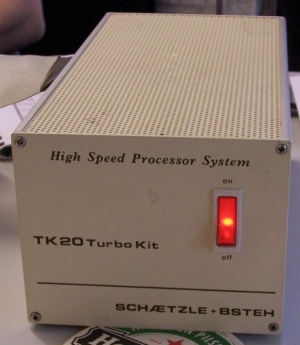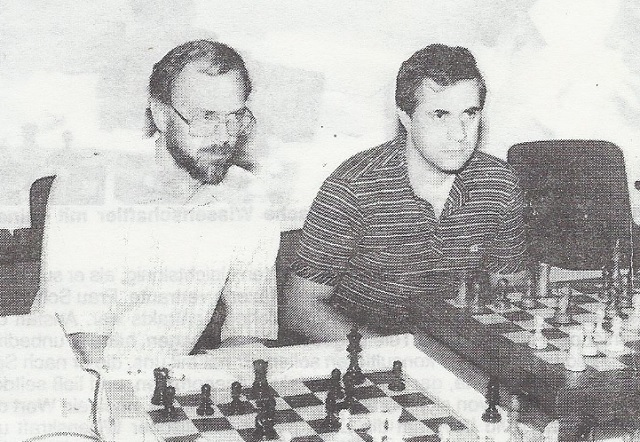Y!
Y! (Why Not),
a chess program written by primary author Ulf Rathsman, supported by Lars Hjörth and book author Sandro Necchi. It was written in 6502 assembly and played tournaments on the TurboKit TK20 by Schaetzle+Bsteh [2]. Y! competed the WMCCC 1988 as Y!88 and the WMCCC 1989 and WCCC 1989 as Y!89 (Why Not 89).
Photos
Ulf Rathsman and Sandro Necchi of Y!88 at the WMCCC 1988 in Almería [3]
Description
based on the WCCC 1989 booklet [4]:
Y!89 uses a full, partly extended, width iterative principal variation search with capture and promotion searches in terminal nodes. The program is designed to be used in a cheap commercial environment, thus the work memory is still just 4 kbytes of RAM, and the good old 6502 eight bit processor is used in tournaments emulated by the also commercially available Turbo kit. The search is fast for a micro, and includes detection of repeated positions (actual as well as potential), and performs extensions for check evasions, passed pawn moves and some king moves in pawn endgames.
Most of the material and positional evaluation is made incrementally by the means of material value tables and positional score boards for each piece type, created once for each position of the game with the computer to move. Some "absolute" evaluation is also done, e.g. for static evaluation of unstoppable passed pawns and pawn structure.
See also
External Links
- Y!'s ICGA Tournaments
- Why Not 89's ICGA Tournaments
- Conchess – Schachcomputer.info Wiki (German) [5]
References
- ↑ Image from ICT 2006 and 13th Chess Computer Users (Gebruikers) tournament old CSVN site Photo Gallery 24, Photos by Eric van Reem and Kees Sio
- ↑ TurboKit – Schachcomputer.info Wiki
- ↑ Image by László Lindner from László Lindner (1989).Die wiederauferstandene Mikro-Weltmeisterschaft - 8.Mikroschachcomputer - WM 1988 in Almeria. Europa-Rochade, 01/02-1989, pdf hosted by Hein Veldhuis (German)
- ↑ Kings Move - Welcome to the 1989 AGT World Computer Chess Championship. Edmonton, Alberta, Canada, Courtesy of Peter Jennings, from The Computer History Museum, pdf
- ↑ Karsten Bauermeister (1998). Die Geschichte der Conchess-Schachcomputer. Computerschach und Spiele, Heft 4, August-September 1998

